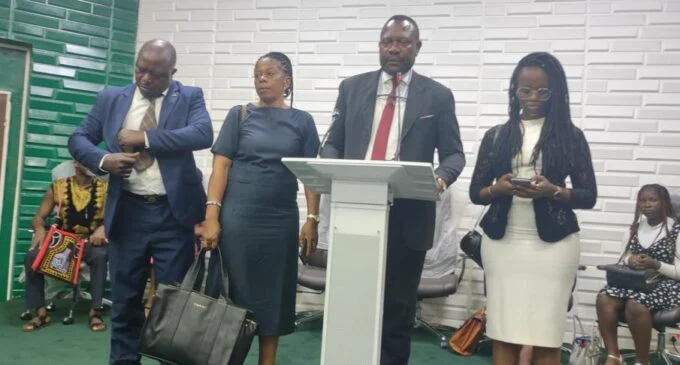Six Cameroonian professors in Nigerian universities, along with four others imprisoned in Cameroon, have appealed to the House of Representatives for help.
The academics said they were arrested in Nigeria on the orders of the Cameroonian authorities over “frivolous allegations of plotting to destabilise the government” of President Paul Biya.
The professors were meeting to discuss the welfare of Cameroonian refugees who had fled to Nigeria, when they were arrested on January 5, 2018.
The academics, who claimed to be refugees and registered asylum seekers in Nigeria, alleged that they were illegally arrested and repatriated to Cameroon.
They were reportedly tried at a military tribunal and sentenced to life imprisonment at the Kondengui maximum security detention facility in Cameroon.
In March 2019, a federal high court in Abuja ruled that the arrest and subsequent detention of the academics were illegal, unconstitutional, and violated the deportees’ rights as guaranteed by the Nigerian constitution.
The UN Human Rights Special Procedures Working Group had asked the Cameroonian government to release the academics over rights violations.
In March, the academics petitioned the house of representatives, seeking its intervention.
Addressing journalists on Tuesday in Abuja, Joseph Fru, counsel to the academics, said his clients were illegally imprisoned by the Cameroonian authorities.
“There is a clarification that we need to make that is fundamental and cardinal. They (our clients) were abducted. They were not arrested. When you say someone is arrested, there is a legal course for them to be picked up by the forces of law and order.
“And in a normal arrest situation, you have probable cause that you are being suspected of committing a crime, and before you get to that point, there has to be a procedure you follow to get either an arrest warrant or a search warrant that may lead to their apprehension.
“But when someone arbitrarily, without any legal course, is picked up and then held for as long as they were held in Nigeria before being sent to Cameroon, that is called an abduction.
“An abduction does not end when we know where they are. That illegal act continues and abides with them until that illegality is cured. And to this point, that illegality has not been cured, and that is why we are still in prison.
“The second thing is that they were not repatriated. You repatriate someone when you go through a legal channel and exhaust all the legal processes, and the court decides that they go back to where they came from to answer in that jurisdiction. Before you repatriate someone, there has to be a bilateral treaty that is observed. None of that in this case,” he said.
Fru, who was flanked by family members of the academics, said relevant government agencies of the Nigerian government were missing at a hearing organised by the House of Representatives committee on a public petition on Tuesday.
He said the government agencies include the office of the attorney-general of the federation, secretary to the government of the federation, ministry of foreign affairs, National Intelligence Agency (NIA), Department of State Services (DSS), and United Nations (UN) high commission country representative.
“We adjourned for June 11, 2024, because the committee is not happy with the fact that the last time, there were elements of the government of the executive arm that were required to be at the hearing, but none of them showed up,” he added.
“So motions were moved, and it was adopted that these entities should necessarily appear in the next hearing so that resolution to this can be taken.
“In the event they do not show up, the committee is ready to move forward. How they move forward depends on their deliberation, and that is above my pay grade.
“The chairman said they were going to give these entities a last chance to appear so they could have enough information to go by and come up with a resolution.”






